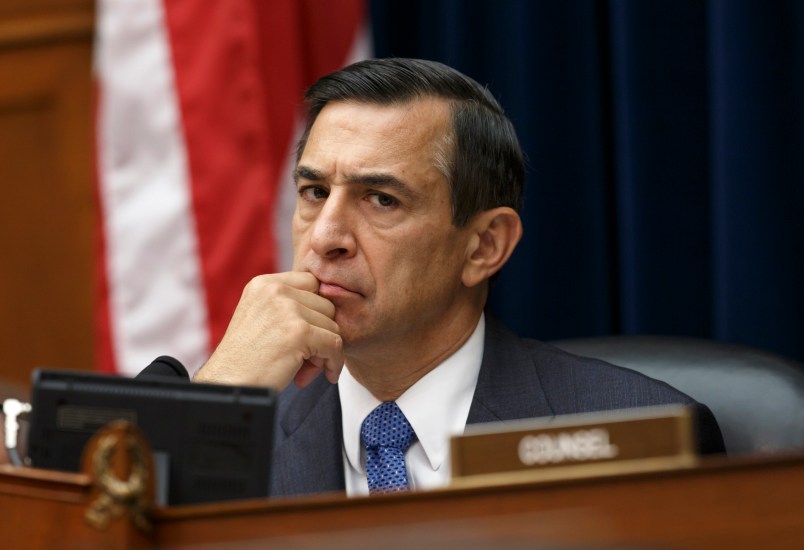Alice Ollstein contributed reporting.
For the last few months, House GOP moderates who have been uncomfortable with their party’s Obamacare repeal bill have had the raucous complaints of House conservative hardliners about the legislation to hide behind. But that shield has fallen, the hardliners are supporting the bill, and now it’s the votes of Republicans from purple and blue districts that determine the fate of the legislation. Those moderates are squirming under the new spotlight chasing them around the Capitol as reporters feverishly construct their own whip counts.
Around 20 moderates have come out against the bill, and handfuls more have retreated into the undecided column. But unlike their House Freedom Caucus counterparts — who relished telling anyone who would listen their demands on Obamacare repeal — the GOP centrists are playing coy about where they stand on the bill and what it would take to move their vote.
”I don’t want to give a full press conference. I answered your question,” Rep. Kevin Yoder (R-KS) told TPM Monday evening after confirming tersely that he was undecided.
Rep. Darrell Issa (R-CA), whose district voted for Hillary Clinton in 2016, smiled like a Cheshire Cat as reporters grilled him Monday evening on where he stands on the bill.
“I have commented many, many times about my undecided position,” he finally said.
Rep. Michael Turner (R-OH) would only say that he was “busy” when a reporter asked him repeatedly Monday evening about his current stance.
Last week a change to the legislation, the American Health Care Act, was unveiled, allowing states to opt out of certain Affordable Care Act insurer mandates. The amendment — hammered out by conservative hardliner leader Rep. Mark Meadows (R-NC) and prominent moderate Rep. Tom MacArthur (R-NJ) — quickly brought most of the House Freedom Caucus on board. For moderates, whose opposition to the original bill was more under the radar, supporting the proposal would put them in violation of a key promise many Republicans made in the repeal fight: that they would preserve Obamacare’s protections for Americans with pre-existing conditions.
Under the new changes, consumers living in states that opted out of the ACA mandate known as community ratings for health status could face higher premiums for any pre-existing conditions.
“We’re going to allow the states to go out there and make a determination for themselves what they want to do in terms of waiving programs. What does that literally mean for people with preexisting conditions? That’s what I need to figure out for myself,” Rep. Brian Mast (R-FL) told reporters coming out of Tuesday morning’s conference meeting. He is now undecided on the a bill, after previously giving a stirring speech encouraging members to vote for it the night before it was pulled from the floor in March.
Top Republicans have said that they are closer than ever on passing the health care bill out of the House. But to get over the finish line, they have had to engage in a new round of arm-twisting. Vice President Mike Pence was at the Capitol Monday afternoon, meeting with members wavering on the bill, such as Yoder and Rep. Mario Diaz-Balart (R-FL).
Diaz-Balart played it cool coming out of the meeting. Asked if he was still undecided, he said he was focusing on the appropriations bill Congress will pass this week to fund the government, and wouldn’t elaborate on what Pence said to him about health care.
The position moderates are in is a tough one: oppose the bill and be blamed for getting in the way of a years-long promise of the GOP; or support it and put yourself at political risk regardless of whether the Senate passes it.
Even before the latest changes, moderates were already feeling the pressure due to the bill’s massive cuts to Medicaid and phase out of the Medicaid expansion. The way the bill restructures the ACA’s tax credits for individual insurance—making them more generous to young people at the expense of older consumers—also puts some members in a pinch.
The current dynamics have allowed some members to assert that more changes are negotiable on the bill, despite the signal from leadership that this is the version they want to move forward.
Rep. Peter King (R-NY) stressed Tuesday morning that he “tend[s] to vote yes” but the current language probably wasn’t final.
“If they don’t have the votes, then they’ll have to make changes,” King said.







Suggesting that Darrel Issa is a “moderate” is ridiculous. He’s a scared hardliner in a bluing district.
As I keep saying, the Overton window is somewhere between Reagan and Genghis Khan these days…and much closer to Genghis Khan than to Reagan.
It’s a good article, but I couldn’t agree more with your peeve. It’s been strange these past months with the press portraying white nationalists as populists and Issa’s ilk as moderate. Where is the exit from this rabbit hole?
Issa? A ‘moderate’? In what multiverse?
What you said !!!